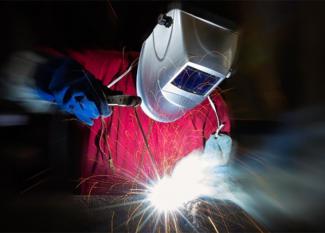NETL leaders participated in the recent kickoff meeting of the Advanced Welding Workforce Initiative (AWWI) to discuss how the new program will provide workers with needed technical skills to fill good-paying jobs in the energy sector and emerging industries across Appalachia.
“The need for welders with advanced technical skills is critical to operate and service tomorrow’s highly efficient power plants and support the region’s growing automotive, aerospace and aviation industries,” said NETL Director Brian Anderson, who provided opening remarks for the virtual meeting held April 13.
“NETL is proud to partner with the Appalachian Regional Commission (ARC) to support an initiative that will not only create needed employment opportunities but will also establish a reliable pipeline of welders critical to the U.S. economy,” said Anderson.
In March, NETL and ARC selected five schools to lead advanced welding education and training programs. Funding for the initiative totals $1 million, with the U.S. Department of Energy (DOE) Office of Fossil Energy High Performance Materials Program providing $750,000.
“I want to commend each awardee we are investing in through this initiative for recognizing the workforce needs in their respective service area and putting together a plan to address these needs,” said ARC Federal Co-Chairman Tim Thomas. “I also want to thank the U.S. Department of Energy and NETL for partnering with ARC to maximize the impact of investments, like these, in communities throughout Appalachia.”
The kickoff meeting featured presentations from the five schools selected to implement specialized curricula and learning modules in welding, robotics, process control and advanced manufacturing techniques. Business and industry representatives took part to provide information about specific workforce needs and to build relationships with the schools that will result in apprenticeships and job placements.
Leaders from NETL and ARC provided overviews about their organizations and their roles in funding and managing the AWWI. NETL representatives also presented a summary of recommendations for energy workforce development, which were submitted by various stakeholders when NETL issued a Request for Information in 2020.
“This collaboration among DOE, NETL and ARC exemplifies how the federal government can coordinate its efforts across agencies and develop beneficial workforce programs, informed by stakeholders, to aid energy communities and strengthen supply chains,” said Briggs White, technology manager, High Performance Materials, NETL.
“ARC is a great partner that provided exceptional guidance related to technical education while NETL contributed valuable insights about the use of new alloys and high-performance materials and manufacturing processes. By collaborating and working with our strong Appalachian stakeholder networks, we have selected five regional technical education programs that will prepare workers for rewarding careers in growing industries where starting wages for certified welders are about $23 per hour plus benefits,” White said.
Currently, there is a national shortage of welders. According to the American Welding Society (AWS), the U.S. welder shortage will reach a deficit of 400,000 workers by 2024. “That means there is a strong job market for workers with the right skills and certification in advanced welding techniques,” White said.
NETL’s support of the AWWI illustrates how the Lab and DOE are advancing the administration’s priorities calling for the creation of good-paying jobs, especially in economically distressed power plant and coal communities, as the nation transitions to a carbon emission-free electricity sector no later than 2035 and economy-wide net-zero emissions by 2050.
The selected AWWI schools that will provide advanced welding training and their funding amounts are:
- Robert C. Byrd Institute at Marshall University, Huntington, West Virginia ($336,796)
- Belmont College, St. Clairsville, Ohio ($281,603)
- Calhoun Community College, Decatur, Alabama, ($198,000)
- Southeast Kentucky Community and Technical College, Cumberland, Kentucky ($105,281)
- Westmoreland County Community College, Youngwood, Pennsylvania ($78,320)
NETL will post additional information about these programs on the NETL website.
The U.S. Department of Energy’s National Energy Technology Laboratory develops and commercializes advanced technologies that provide clean energy while safeguarding the environment. NETL’s work supports DOE’s mission to ensure America’s security and prosperity by addressing its energy and environmental challenges through transformative science and technology solutions.
The Appalachian Regional Commission is an economic development agency of the federal government and 13 state governments focusing on 420 counties across the Appalachian Region. ARC’s mission is to innovate, partner and invest to build community capacity and strengthen economic growth in Appalachia to help the region achieve socioeconomic parity with the nation.




